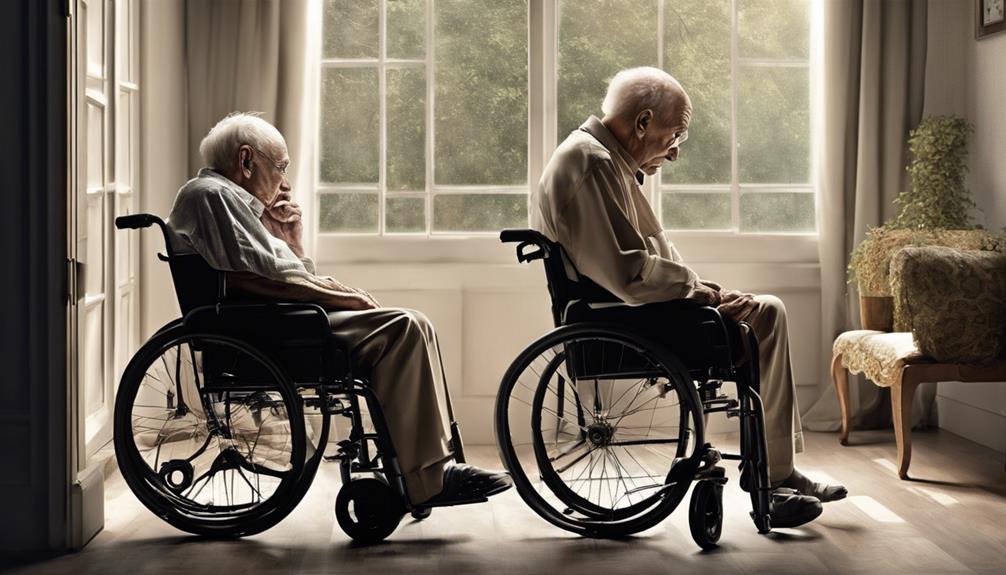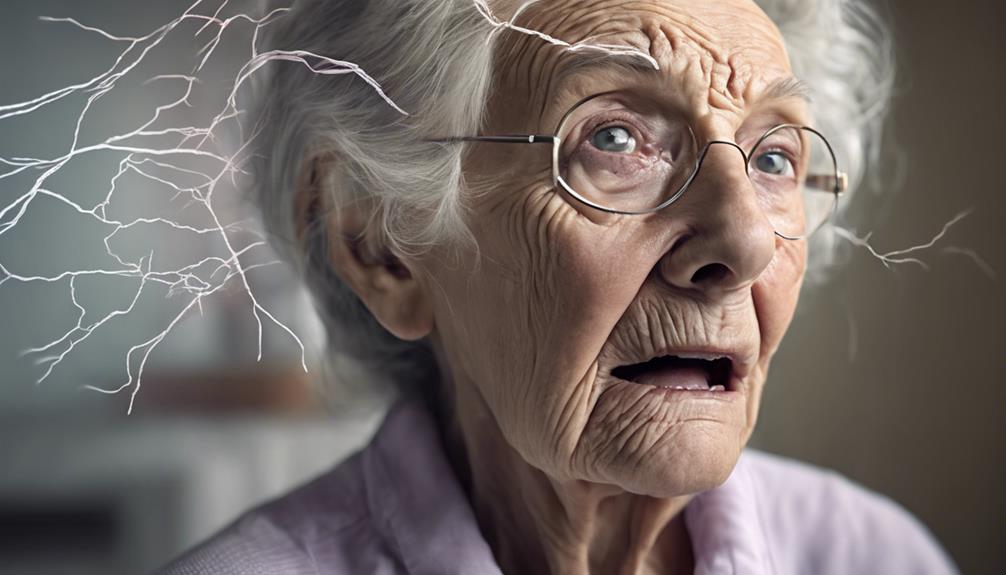Just about everybody is familiar with the legendary musician Glen Campbell, but were you aware that he battled Alzheimer’s disease during his final years? Translated version: Most of us are familiar with the iconic musician Glen Campbell, but did you know he struggled with Alzheimer’s disease in his final years?
The impact of dementia goes far beyond what meets the eye. From celebrities to politicians, athletes, artists, and business leaders, the prevalence of this condition among prominent figures raises questions about awareness, challenges, and coping strategies.
Let’s explore the hidden stories and unique perspectives of individuals navigating the complexities of dementia in the public eye.
Key Takeaways
- Celebrities, politicians, athletes, artists, and business leaders face dementia challenges.
- Need for cognitive health assessments for politicians and awareness about memory issues.
- Cognitive decline risks in athletes necessitate research and prevention efforts.
- Dementia impacts artists’ creativity and communication, hindering their artistic process.
Celebrities Battling Dementia
Celebrities facing dementia, including iconic figures like Gene Wilder and Glen Campbell, have bravely shared their battles with the public, shedding light on the impact of this neurological condition on their lives. These individuals, known for their talent and contributions to the entertainment industry, have shown tremendous courage in raising awareness about dementia.
Gene Wilder, beloved for his roles in timeless films like ‘Willy Wonka & the Chocolate Factory,’ fought Alzheimer’s disease until his passing in 2016. Similarly, Glen Campbell, a legendary country music artist, disclosed his Alzheimer’s diagnosis in 2011, demonstrating resilience by continuing to perform despite his health challenges.
Perry Como, a distinguished singer and TV personality, encountered dementia in his later years, affecting his ability to recall lyrics and deliver performances. Estelle Getty, famous for portraying Sophia Petrillo on ‘The Golden Girls,’ grappled with Lewy body dementia, highlighting the diverse manifestations of this condition. Additionally, Terry Jones of Monty Python fame faced primary progressive aphasia, showcasing the different forms of dementia that can impact individuals from various backgrounds.
Through their openness, these celebrities haven’t only shared their personal struggles but also emphasized the importance of support and understanding for those living with dementia.
Politicians Coping With Memory Loss

Amidst the public spotlight, politicians facing memory loss have sparked discussions surrounding their cognitive health and ability to fulfill their duties. Notable figures such as former U.S. President Ronald Reagan, former British Prime Minister Harold Wilson, former Malaysian Prime Minister Mahathir Mohamad, former Czech President Vaclav Havel, and former Australian Prime Minister Bob Hawke have all faced challenges with memory loss. These instances have raised concerns about the impact of cognitive decline on political leadership.
The cases of these politicians highlight the importance of assessing cognitive health in public figures, as memory loss can significantly affect decision-making and overall performance in office. Addressing memory issues promptly and transparently is crucial to ensuring that politicians can continue to serve effectively and make informed decisions for the benefit of the public.
As public servants, politicians must prioritize their cognitive well-being to uphold the trust and confidence of the constituents they represent. The discussion surrounding politicians coping with memory loss underscores the need for awareness and proactive measures to support leaders facing cognitive challenges.
Athletes Facing Cognitive Decline
Retired athletes diagnosed with chronic traumatic encephalopathy (CTE), a neurodegenerative disease associated with repeated head injuries, are increasingly drawing attention to the risks of cognitive decline in sports. Studies have demonstrated that contact sports such as football and boxing pose a higher likelihood of cognitive decline and dementia in later life. Symptoms of CTE and other forms of dementia in athletes may manifest as memory loss, confusion, mood fluctuations, and challenges with motor skills. The cumulative effects of concussions and subconcussive hits in sports can significantly contribute to the onset of cognitive impairments and dementia.
To address these concerns, retired athletes and sports organizations are placing a growing emphasis on research, prevention, and management strategies aimed at tackling cognitive decline and dementia in former players. By raising awareness, implementing preventive measures, and supporting affected individuals, the sports community is striving to mitigate the potential long-term consequences of head injuries in athletes and improve the overall well-being of those who’ve dedicated themselves to competitive sports.
Artists Struggling With Forgetfulness

Athletes aren’t the only individuals facing the devastating impact of cognitive decline; artists too are grappling with the challenges of forgetfulness, affecting their creative abilities and artistic endeavors. Dementia can profoundly alter the artistic landscape for these individuals, hindering their capacity to produce and express themselves. Here are some ways in which artists struggling with forgetfulness may be impacted:
- Memory and Cognitive Abilities: Dementia can impair an artist’s memory, making it difficult to recall techniques, concepts, or even their own body of work.
- Artistic Process: The ability to engage in the artistic process may be compromised, leading to challenges in conceptualizing, planning, and executing new projects.
- Communication and Expression: Artists may struggle to communicate their artistic vision or emotions effectively through their work, limiting the depth of their expression.
- Physical Skills: Visual artists may face difficulties with spatial awareness, color recognition, and fine motor skills, affecting the technical aspects of their artistry.
These struggles not only hinder their creative output but also rob them of the joy and fulfillment that artistry once brought them.
Business Leaders and Memory Challenges
In examining the impact of memory challenges on business leaders, it becomes evident that dementia can significantly influence decision-making capabilities and strategic acumen within corporate settings. Business figures like Sumner Redstone and Kirk Kerkorian have faced memory challenges associated with dementia, highlighting the potential ramifications on leadership skills. Memory impairment not only hampers cognitive function but also diminishes the ability to navigate complex business operations and maintain essential industry relationships. The cognitive decline resulting from dementia can compromise the overall performance and strategic vision of business leaders, affecting not only their personal well-being but also the success of the organizations they lead.
Addressing dementia in business leaders is paramount to ensuring appropriate support mechanisms and decision-making processes within corporate environments. Recognizing the signs of dementia early on and implementing strategies to accommodate memory challenges can mitigate the negative impacts on leadership effectiveness. By acknowledging and proactively managing dementia in business leaders, companies can uphold operational efficiency, foster innovation, and sustain meaningful industry relationships.
Frequently Asked Questions
Can Dementia Be Prevented or Delayed Through Lifestyle Changes?
Yes, dementia can potentially be prevented or delayed through lifestyle changes. Engaging in regular physical exercise, maintaining a healthy diet rich in fruits and vegetables, staying socially active, challenging the brain with mental exercises, and managing cardiovascular risk factors like hypertension and diabetes can all contribute to lowering the risk of developing dementia.
These lifestyle choices play a crucial role in promoting brain health and overall well-being.
How Does Dementia Impact Relationships With Family and Friends?
Dementia can significantly impact relationships with family and friends. It can cause changes in behavior, communication difficulties, and memory loss, leading to challenges in maintaining connections.
As caregivers, we must adapt to these changes, showing empathy, patience, and understanding. Providing emotional support, engaging in meaningful activities, and seeking professional help can help navigate the complexities of maintaining relationships with loved ones affected by dementia.
Are There Any Promising New Treatments or Therapies for Dementia?
Well, there are some promising new treatments and therapies for dementia emerging in the field. Research shows that certain medications and cognitive interventions can help manage symptoms and slow down the progression of the disease.
Additionally, lifestyle changes like regular exercise, healthy diet, and social engagement have been found to be beneficial.
It’s important to stay informed about these advancements to provide the best care for those affected by dementia.
How Does the Stigma Surrounding Dementia Affect Those Diagnosed With the Condition?
The stigma surrounding dementia can deeply impact those diagnosed with the condition. It can lead to feelings of shame, isolation, and a reluctance to seek help or share their experiences.
This stigma may also hinder access to support services and resources. It’s crucial to challenge misconceptions and promote understanding to create a more supportive and inclusive environment for individuals living with dementia.
What Are Some Common Misconceptions About Dementia That Need to Be Addressed?
Some common misconceptions about dementia that need addressing include the belief that it only affects memory. Dementia is a complex condition that can impact various cognitive functions and behaviors.
Another misconception is that all dementia cases are the same, when in reality there are different types with unique symptoms and progression.
Understanding these misconceptions can help us provide better support and care for individuals living with dementia.
Conclusion
As we reflect on the various individuals who’ve publicly battled dementia, we’re reminded of the harsh reality that this condition doesn’t discriminate based on fame or success. Despite their achievements and contributions to society, they too are facing the challenges of memory loss and cognitive decline.
It serves as a stark reminder that dementia can affect anyone, regardless of their status or accomplishments, highlighting the importance of continued research and support for those impacted by this devastating condition.









